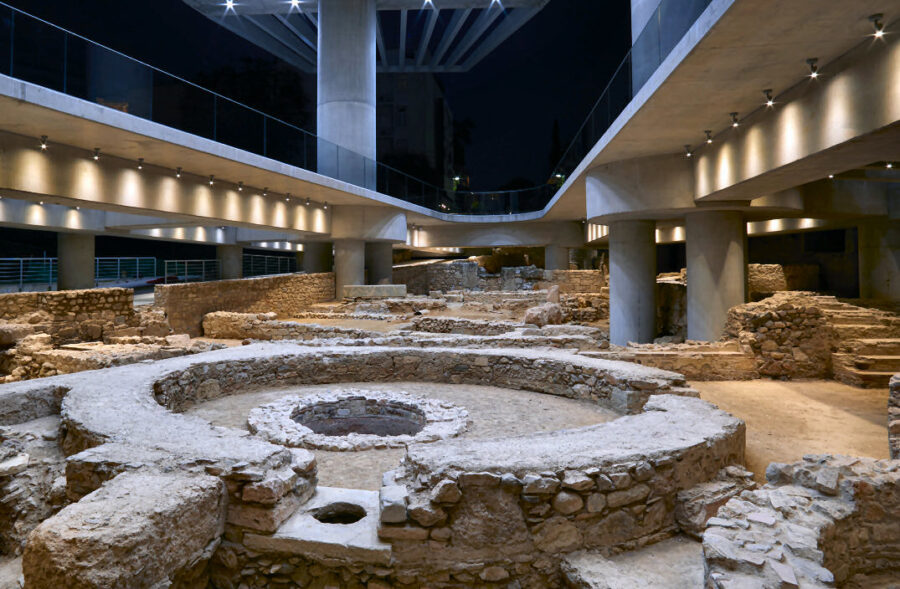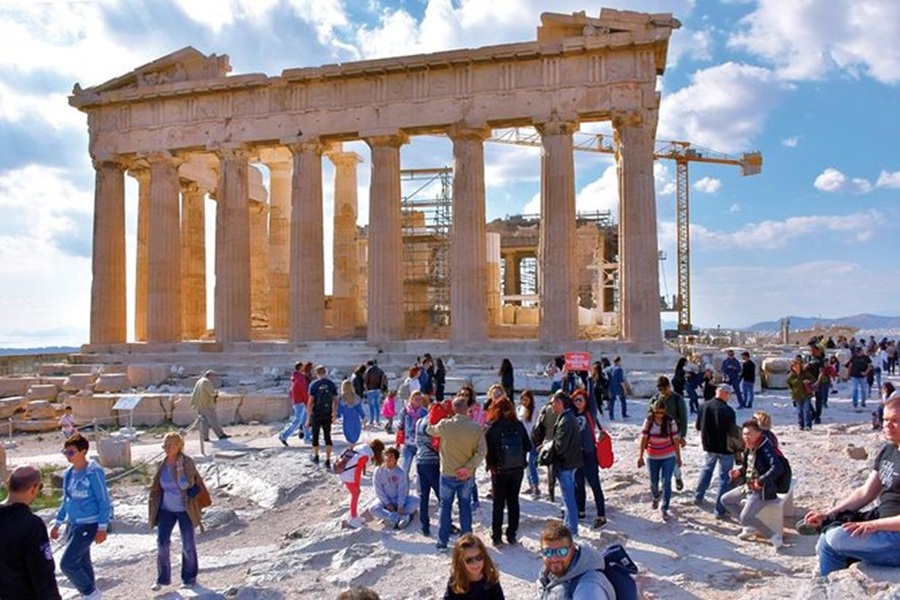
Best Time to Visit Athens: Optimal Months for Perfect Weather and Fewer Crowds in 2025
Planning a trip to Athens? Timing really matters in this historic city.
The best time to visit Athens is during late spring (May) and early fall (September to October) when the weather is pleasant and the crowds are smaller. These shoulder seasons give you warm days for exploring ancient ruins, without the brutal summer heat or overwhelming tourist numbers.
During these months, you’ll find temperatures that make walking around the Acropolis genuinely comfortable. The skies usually stay clear, so your photos of those iconic marble structures pop against the blue Mediterranean backdrop.
Hotels tend to drop their prices compared to peak summer, which is a nice bonus. Avoid the intense heat and crowds of July and August if you can.
Spring brings wildflowers blooming among the ancient stones. Fall gives you warm sea temperatures—ideal if you’re thinking about day trips to nearby beaches or islands.
Contents
- Key Takeaways
- Understanding Athens’ Seasons
- Spring: Mild Weather and Blooming Landscapes
- Summer: Peak Season and Hot Days
- Autumn: Comfortable Temperatures and Fewer Crowds
- Winter: Quiet Charm and Festive Spirit
- Factors to Consider When Choosing the Best Time to Visit Athens
- Weather Conditions and Climate
- Crowds and Local Events
- Budget and Accommodation Availability
- Top Activities Month by Month
- Sightseeing and Historical Landmarks
- Cultural Festivals and Events
- Outdoor Adventures and Sports
- Visiting the Acropolis and Other Ancient Sites
- Best Months for Exploring Monuments
- Tips for Avoiding Queues and Heat
- Best Time for Island Day Trips from Athens
- When to Sail and Explore Nearby Islands
- Recommended Excursions to Greek Islands
- Seasonal Travel Around Athens
- Pairing Athens with Thessaloniki
- Itineraries Including Crete and Santorini
- Expert Tips for Planning Your Athens Trip
- Packing Essentials by Season
- Booking Advice for High and Low Seasons
- Frequently Asked Questions
- What are the peak and off-peak tourist seasons for experiencing Athens?
- Which months offer the most favorable weather for sightseeing in Athens?
- Can you suggest the ideal length of stay to fully enjoy the historical attractions of Athens?
- Outside of the popular summer months, are there any hidden gem periods to explore Athens?
- How do the events and festivals in Athens throughout the year affect the best time to visit?
- In terms of budget travel, when are the most cost-effective times to plan a trip to Athens?
- What are the peak and off-peak tourist seasons for experiencing Athens?
- Which months offer the most favorable weather for sightseeing in Athens?
- Can you suggest the ideal length of stay to fully enjoy the historical attractions of Athens?
- Outside of the popular summer months, are there any hidden gem periods to explore Athens?
- How do the events and festivals in Athens throughout the year affect the best time to visit?
- In terms of budget travel, when are the most cost-effective times to plan a trip to Athens?
- More Travel Guides
Key Takeaways
Understanding Athens’ Seasons

Athens cycles through distinct seasons, each with its own quirks and perks. The city’s Mediterranean climate really shapes the whole travel experience.
Spring: Mild Weather and Blooming Landscapes
Spring in Athens (March to May) is honestly kind of magical. The city wakes up with wildflowers and comfortable temperatures—think 15°C to 25°C (59°F to 77°F).
You can wander the ancient sites like the Acropolis without sweating buckets under the sun. April and May stand out as especially good months.
The city’s parks and hills turn green, making your photos look amazing. You’ll also dodge the summer tourist rush.
Spring sometimes throws in a rain shower, so pack a light jacket and maybe an umbrella. The rain rarely sticks around for long.
Local festivals pop up everywhere, letting you soak in authentic Greek culture while you sightsee.
Summer: Peak Season and Hot Days
Summer (June to August) hits Athens with serious heat. Temperatures often shoot past 33°C (91°F), and July and August can get up to 38°C (100°F) by midday.
These months bring in the biggest tourist crowds—hotel prices jump and the main attractions get packed. If you go in summer, stick to outdoor activities early in the morning or after the sun drops.
The ruins don’t offer much shade, so exploring at noon can feel like a bad idea. Many locals actually skip town during August because of the heat.
On the upside, summer nightlife in Athens is wild—rooftop bars, outdoor cinemas, beach clubs all come alive. The coast gets busy with people using Athens as a base for day trips or island hopping.
Autumn: Comfortable Temperatures and Fewer Crowds
Autumn (September to November) might just be Athens’ best-kept secret. September and October bring warm days (around 25°C / 77°F) but without the summer misery.
Tourist crowds thin out fast after mid-September, so you get some breathing room at the big sites. Hotels drop their rates, and it’s easier to get a table at popular restaurants.
The sea stays warm enough for swimming through October, so you can mix city exploring with beach time. November cools off and brings the occasional rain, but you still get plenty of sunny days.
The autumn light casts a golden glow over the ancient monuments—honestly, the photos are unreal. Fall food festivals celebrate olive and wine harvests, which is a treat if you’re into local flavors.
Winter: Quiet Charm and Festive Spirit
Winter (December to February) turns Athens into a chill, peaceful city. Temperatures hover between 5-15°C (41-59°F)—cold, but rarely freezing.
You’ll want a coat, but snow almost never falls in the city center. December brings festive lights and Christmas markets to Syntagma Square and other central spots.
You can experience Athens like a local, ducking into cozy tavernas for fasolada (bean soup) or stifado (beef stew). The best part? Ancient sites are basically empty.
Imagine wandering the Acropolis with just a handful of other visitors. Museums often run special winter exhibitions, and indoor sites become more appealing.
Rainy days happen, but the sun usually comes back out soon. January offers the year’s lowest hotel prices, so you can splurge on a nice room without breaking the bank.
Factors to Consider When Choosing the Best Time to Visit Athens
Figuring out when to visit Athens really depends on your comfort with heat, how much you can stand crowds, and your budget. These factors can totally change your experience.
Weather Conditions and Climate

Athens has a Mediterranean climate with clear seasons. Summers (June-August) get brutally hot, often climbing above 90°F (32°C).
These scorching days can make sightseeing a sweaty, exhausting ordeal—especially around the shade-free Acropolis. Spring (March-May) gives you milder temperatures (60-75°F / 15-24°C), flowers everywhere, and green hills.
Fall (September-November) feels a lot like spring, with pleasant weather cooling off toward winter. You can still swim in the sea in September and sometimes even in October.
Winter (December-February) cools down to about 50°F (10°C), with rain here and there. It’s rarely freezing, but some attractions might shorten their hours.
Crowds and Local Events

Tourist crowds hit their peak in summer, especially July and August, when Europeans take their vacations. The Acropolis and other top sites get packed, and lines can get long.
Spring and fall are way more relaxed—fewer tourists, but the city still feels lively. You’ll get better service at restaurants and cafés.
Greek Orthodox Easter (date changes every year) is a wild time to visit Greece. Expect candlelit processions and special celebrations, but be aware: lots of businesses close for the holiday.
The Athens Festival, running May to October, brings performances to the ancient Odeon of Herodes Atticus. That’s a bucket-list experience for culture lovers.
Budget and Accommodation Availability

Hotel prices in Athens swing with tourist seasons. Summer rates can be 30-50% higher than off-season, especially for those with Acropolis views or rooftop pools.
The shoulder seasons (April-May and September-October) offer the best bang for your buck—good weather, reasonable prices, and plenty of options.
Winter brings rock-bottom rates, with hotels slashing prices to lure travelers. If you’re planning a budget trip and don’t mind a little rain, this is your time.
Book early if you’re coming during popular events or holidays. Platforms like Booking.com make it easier to compare prices and snag deals for your Athens adventure.
Top Activities Month by Month
Athens changes with the seasons, and each month has its own vibe. The weather and local events really shape what you’ll want to do.
Sightseeing and Historical Landmarks

January and February are perfect for museum visits. With hardly any tourists around, you can take your time in the Acropolis Museum or wander the ruins without being jostled.
Temperatures average 10-15°C (50-59°F), so it’s cool but not miserable. March to May is prime time for historical exploration.
The Acropolis and Ancient Agora burst with spring flowers—your photos will look fantastic. Morning hikes up Lycabettus Hill give you sweeping views before the heat kicks in.
September to November brings a second golden window. The archaeological sites are less crowded, and temperatures (15-25°C) are just right for exploring.
The National Archaeological Museum is a great backup if you hit a rainy day in December.
Cultural Festivals and Events

May means Athens Jazz Festival, with local and international acts popping up around the city. Greek Orthodox Easter (usually in April) lets you dive into deep-rooted traditions and feast on special foods.
Summer lights up with the Athens Epidaurus Festival (June-August)—ancient dramas in actual ancient theaters. The Athens Open Air Film Festival runs through the warm nights, with movies screened in archaeological sites.
Fall brings the Athens International Film Festival in September, and OXI Day (October 28th) with parades and celebrations. December’s Christmas markets in Syntagma Square run through January, so you can soak up the festive spirit.
Outdoor Adventures and Sports

April and May are awesome for hiking nearby mountains or kayaking along the Athens Riviera. The weather’s just right—comfortable, not sweltering.
June through August is all about swimming. Beaches like Vouliagmeni and Glyfada fill up with locals and tourists.
If you want to work out outdoors, stick to early mornings or evenings during these hot months. September and October stay warm enough for water sports, but the crowds thin out.
Mountain biking gets popular again as the air cools. November through March is the best time for urban walking tours and mild hikes—fewer people, pleasant temps.
Visiting the Acropolis and Other Ancient Sites
Athens’s ancient monuments are stunning any time, but with a little planning, you can turn a crowded, sweaty visit into something almost magical.
Best Months for Exploring Monuments
April, May, early June, late September, and October really hit the sweet spot. Temperatures stay mild (usually 65-80°F), so climbing those marble steps won’t feel like a punishment.
Spring brings wildflowers to the ruins—your photos will thank you. May’s golden light looks incredible on the Parthenon.
In fall, you can catch sunset views when the ancient marble glows amber. The Acropolis Museum also gets quieter, letting you actually appreciate the artifacts.
Winter (November-March) means almost no crowds, but you might have to dodge some rain. Some sites shorten their hours, so double-check before heading out.
Tips for Avoiding Queues and Heat
Hit the Acropolis right when it opens (8:00 am) or later in the afternoon (5:00-6:00 pm). Early mornings beat both crowds and heat, while evenings give you killer sunset views.
The light at those times? Perfect for photos. Buy your tickets online to skip the ticket line.
If you’re planning to visit several ancient sites, grab the multi-site pass—it’s good for five days and saves you a bit of cash. Bring water, even in cooler months; the climb is thirsty work.
A hat and sunscreen are non-negotiable, no matter when you go. Visit the Acropolis Museum during the hottest part of the day, then head to the site itself when it cools off.
Weekdays, especially Tuesday through Thursday, are usually less crowded than weekends. In high season (July-August), expect crowds at pretty much any time.
Best Time for Island Day Trips from Athens
Athens is a great base for exploring nearby Greek islands—no need to spend the night away from the city. Timing these trips depends on the weather, ferry schedules, and how busy the islands get during peak season.
When to Sail and Explore Nearby Islands

Late May to early June and September are just about perfect for island day trips from Athens. The weather sits around 75-85°F (24-29°C), and you can actually breathe without the summer crowds.
The seas feel calmer during these shoulder months. Trust me, that matters when you’re on a ferry crossing open water.
I once tried sailing in November—huge mistake. I spent most of the ride fighting off seasickness.
Ferry schedules ramp up in spring and fall, so you get more flexibility for your return. Once November hits, a lot of islands cut service way back.
Try to skip July and August if you can. The heat gets intense (above 90°F/32°C), and ferries become a zoo.
Recommended Excursions to Greek Islands

The Saronic Islands are your easiest day trip from Athens. Aegina is the closest—just 40 minutes from Piraeus by fast ferry.
Aegina has beautiful beaches, the striking Temple of Aphaia, and those pistachios everyone talks about.
Hydra is another solid pick, about 1.5 hours away. It’s car-free, so donkeys do the heavy lifting. The island’s architecture stuns, and the swimming spots are unreal.
Looking for something different? Agistri is a tiny, pine-covered island with turquoise water. It’s less touristy but just as pretty.
If you have your heart set on Santorini, brace yourself for a long day. It’s much farther than the Saronic Islands, so you’ll need an early start and a late return. Some day tours fly there, but they’re pricey.
Always double-check ferry times before you leave Athens. Getting stuck overnight isn’t fun.
Seasonal Travel Around Athens
Athens makes a great base for exploring Greece. May-June and September-October are sweet spots—nice weather, fewer tourists.
Pairing Athens with Thessaloniki

Thessaloniki, Greece’s lively second city, pairs well with Athens. The train ride takes about 4 hours, and you’ll get some beautiful countryside views.
Thessaloniki feels less touristy and more laid-back. The food scene is fantastic—seriously, don’t skip it.
The waterfront is perfect for evening walks. Byzantine churches and Roman ruins give the city some real cultural depth.
May and October stand out for combining these cities. The weather’s mild, and you dodge the worst crowds.
I usually recommend 3 days in Athens, then 2-3 days in Thessaloniki. That gives you a good taste of northern Greece.
Itineraries Including Crete and Santorini
Late May through June or September is prime time for island-hopping from Athens to Santorini and Crete. The seas are warm, and the crowds haven’t taken over yet.
Santorini is only a 45-minute flight (or a much longer ferry ride, 5-8 hours) from Athens. The famous white buildings and blue sea? Even better when you aren’t elbowing through crowds.
Crete really deserves 4-5 days, minimum. It’s Greece’s biggest island—think Minoan ruins, mountain villages, and some of the country’s best beaches.
You can get from Santorini to Crete by ferry in about 2 hours.
If you have two weeks, try: 3 days in Athens, 3 in Santorini, 5 in Crete, and use the rest for travel days. That mix feels just right—history, scenery, and a taste of real Greek life.
Expert Tips for Planning Your Athens Trip

Planning your Athens adventure takes a bit of strategy. Get the details right, and your trip goes from good to amazing.
Packing Essentials by Season
Summer (June-August) in Athens is no joke—pack light, breathable clothes, and don’t forget a hat and sunglasses. It often hits 90°F or more.
Bring good walking shoes. Athens has hills and plenty of ancient, uneven ground.
Spring and fall? Go for layers. It can be chilly in the morning but warm up by afternoon. A light jacket or sweater works well.
If you’re coming in winter (November-February), pack a waterproof jacket and warm layers. Athens gets chilly and rainy, but it rarely freezes. An umbrella helps a lot.
Year-round, you’ll want these essentials:
- Reusable water bottle
- Sunscreen (yes, even in winter)
- Power adapter for European plugs
- Comfy walking shoes
Booking Advice for High and Low Seasons
Book your hotel at least 3-4 months early if you’re coming in high season (June-September). Places near the Acropolis fill fast, and prices shoot up in summer.
Shoulder seasons (April-May or October) give you better deals. Hotels can be up to 40% cheaper, and the weather’s still great.
If your schedule’s flexible, try arriving mid-week—rates are usually lower than weekends. Bundling your flight and hotel can also save you some cash.
Here’s a tip: buy skip-the-line tickets for big sites like the Acropolis before you go. Waiting in line for an hour in the sun? No thanks.
Frequently Asked Questions
Timing matters when you visit Athens. Here are some answers to common questions travelers ask.
What are the peak and off-peak tourist seasons for experiencing Athens?
Peak season runs June through August. The city gets packed, and the Acropolis turns into a sea of selfie sticks.
Off-peak is November to March. Fewer tourists, shorter lines, and cheaper hotels. Locals say this is when you see a more authentic Athens.
April-May and September-October hit that sweet spot—good weather, manageable crowds.
Which months offer the most favorable weather for sightseeing in Athens?
Spring (March to May) is lovely for sightseeing—temps hover between 60-75°F (15-24°C). Flowers bloom, and it’s comfortable for walking.
Fall (September to November) feels just as nice. The heat fades, but the Mediterranean warmth lingers. October, especially, can be gorgeous.
Try to avoid July and August unless you love sweating it out.
Can you suggest the ideal length of stay to fully enjoy the historical attractions of Athens?
I’d say you need at least 3 days to see Athens’ main historical sites. That covers the Acropolis, Ancient Agora, and the big museums.
If you want a slower pace, 4-5 days lets you wander neighborhoods like Plaka and Monastiraki, eat well, and maybe fit in a day trip.
If you’re a real history buff, stay a week. There’s enough history here to keep you busy.
Late February to early March is underrated. The crowds haven’t arrived, prices drop, and Greek Carnival (Apokries) brings a festive vibe.
Early November is another gem—autumn colors in the National Garden and perfect temps for archaeological sites.
December can surprise you with its cozy Christmas markets and mild winter weather.
How do the events and festivals in Athens throughout the year affect the best time to visit?
The Athens Epidaurus Festival (May-October) brings performances to ancient theaters, including the Odeon of Herodes Atticus. Seeing a concert under the Acropolis? Unforgettable.
Easter (April or May) transforms the city—candlelit processions, special church services, and feasts. It’s a deep cultural experience, though some shops close during Holy Week.
The Athens Marathon in November energizes the city. If you’re not running, you can either plan around it or just enjoy the buzz.
In terms of budget travel, when are the most cost-effective times to plan a trip to Athens?
January and February usually bring the lowest hotel rates in Athens. I’ve seen prices dip 40-50% compared to the summer.
A lot of places toss in special winter packages just to get people in the door during those quieter months.
If you’re after value, November through March (except for Christmas and New Year’s) is hard to beat. Flights drop in price, restaurants run discounts, and even some attractions cut their admission fees.
Early May and late October are kind of the sweet spot. The weather’s decent, crowds haven’t taken over, and you can snag pre- or post-season prices.
Plenty of travelers say they save 25-30% by skipping peak summer. That’s not nothing.
What are the peak and off-peak tourist seasons for experiencing Athens?
Peak season runs June through August. The city gets packed, and the Acropolis turns into a sea of selfie sticks.
Off-peak is November to March. Fewer tourists, shorter lines, and cheaper hotels. Locals say this is when you see a more authentic Athens.
April-May and September-October hit that sweet spot—good weather, manageable crowds.
Which months offer the most favorable weather for sightseeing in Athens?
Spring (March to May) is lovely for sightseeing—temps hover between 60-75°F (15-24°C). Flowers bloom, and it’s comfortable for walking.
Fall (September to November) feels just as nice. The heat fades, but the Mediterranean warmth lingers. October, especially, can be gorgeous.
Try to avoid July and August unless you love sweating it out.
Can you suggest the ideal length of stay to fully enjoy the historical attractions of Athens?
I’d say you need at least 3 days to see Athens’ main historical sites. That covers the Acropolis, Ancient Agora, and the big museums.
If you want a slower pace, 4-5 days lets you wander neighborhoods like Plaka and Monastiraki, eat well, and maybe fit in a day trip.
If you’re a real history buff, stay a week. There’s enough history here to keep you busy.
Late February to early March is underrated. The crowds haven’t arrived, prices drop, and Greek Carnival (Apokries) brings a festive vibe.
Early November is another gem—autumn colors in the National Garden and perfect temps for archaeological sites.
December can surprise you with its cozy Christmas markets and mild winter weather.
How do the events and festivals in Athens throughout the year affect the best time to visit?
The Athens Epidaurus Festival (May-October) brings performances to ancient theaters, including the Odeon of Herodes Atticus. Seeing a concert under the Acropolis? Unforgettable.
Easter (April or May) transforms the city—candlelit processions, special church services, and feasts. It’s a deep cultural experience, though some shops close during Holy Week.
The Athens Marathon in November energizes the city. If you’re not running, you can either plan around it or just enjoy the buzz.
In terms of budget travel, when are the most cost-effective times to plan a trip to Athens?
January and February usually bring the lowest hotel rates in Athens. I’ve seen prices dip 40-50% compared to the summer.
A lot of places toss in special winter packages just to get people in the door during those quieter months.
If you’re after value, November through March (except for Christmas and New Year’s) is hard to beat. Flights drop in price, restaurants run discounts, and even some attractions cut their admission fees.
Early May and late October are kind of the sweet spot. The weather’s decent, crowds haven’t taken over, and you can snag pre- or post-season prices.
Plenty of travelers say they save 25-30% by skipping peak summer. That’s not nothing.



